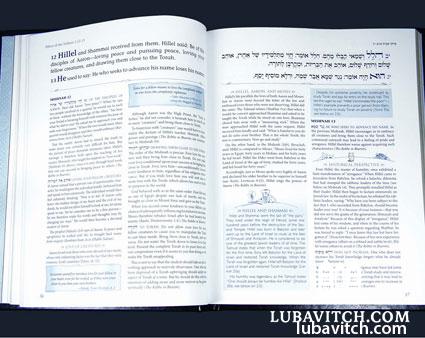(lubavitch.com) Kehot Publication Society, the Lubavitch publishing house, recently announced the publication of Pirkei Avot: Ethics of the Fathers With a New Commentary, Anthologized from the works of the Classic Commentators and the Chasidic Masters, translated and compiled by Rabbi Yossi Marcus.
The Talmud refers to Ethics of the Fathers as a guide for the individual who wishes to become a Chasid. The Talmudic understanding of a “Chasid” is one who excels beyond the letter of the law in his self-refinement and character development. Ethics of the Fathers is a collection of valuable advice from the sages of antiquity concerning basic life-skills such as exercising leadership, dealing with others, and personal character refinement.
This edition of Pirkei Avot takes a practical and relevant approach in understanding the text so that it applies to the life of the reader. In addition to classical commentary, the anthology culls from modern Chasidic thought and the works of ancient Kabbalists to provide a profound and esoteric understanding illuminating the deeper implications of the life-lessons to be learned from Pirkei Avot, and formulating a practical “guide” of directives on how to become a Chasid.
Many of the commentaries in the digest are insights from the Lubavitcher Rebbe, Rabbi Menachem M. Schneerson. The Rebbe’s deep appreciation for Torah and the human psyche is evident in the way he finds current application for the timeless wisdom of the ancients. Other sources featured prominently in the book include Rabbi Yehuda Loewe–the Maharal of Prague (1520-1609), and Chida–Rabbi Chaim Yosef David Azulai (1724-1807), both noted for their esoteric approach in understanding rabbinic texts. Hundreds of different interesting and informative commentaries from Jewish thinkers spanning two millennia, handpicked by the compiler, formulate this rich composition.
Generally, anthologies of this sort tend to strip commentaries of their original style, borrowing only the direct noteworthy points. In this version, however, the compiler retained a lot of the feel and flavor of the original commentary in his translation.
The book is aesthetically pleasing as well. Its large binding, silver gilded pages and ornately embossed lettering will look great on the coffee table or bookshelf.
Subtle, thematic Illustrations and artwork of the column headings helpfully guide the reader through the various styles of commentary in order to personalize his learning experience. Shades of blue add color to the elegant antique style of the layout and design. The writing engages the reader, addressing him in the first person so that the life-lessons appear to be more personally applicable.
The commentary’s text includes historical background, brief biographies, and insights into the lives of the Mishnaic sages whose sayings make up the Ethics of the Fathers.
Pirkei Avot is a collection of teachings from leading Jewish sages spanning a period of more than five-hundred years–from the time following the compilation of the Bible at the beginning of the second temple period (circa 360 BCE) until well into the second century. During these years, great challenges faced the Jewish people; new opposing factions arose within the Jewish community that threatened to undermine the foundations and future of Judaism; the world was shaken by radical changes due to an unsettled civilization in the transformation from Greek to Roman rule.
Many of the teachings in Pirkei Avot reflect the attitude of the sages during those oppressive times and the historic insights in this edition provide the reader with a thorough appreciation of the context and personage behind every teaching. These historic and biographic columns are not the compiler’s personal understanding of history. Rather, they are anthologized from accounts found in the Talmud and other classic sources.
Illustrative anecdotes are another outstanding feature of this edition. They appear in italics and in shaded artistic scroll-shaped boxes that include a diverse range of short stories and messages from the Talmud and Chasidic literature and folklore. These illustrate the value and application of the lessons of Pirkei Avot and make for easy and truly enjoyable reading.
Insights into the etymology and linguistic nuances of the Mishnah are easily discernable from the Kabbalistic perspectives thanks to intricate artistic designs that distinguish between the different headings that neatly departmentalize and clearly mark the various sections of the commentary. This allows the reader to choose his preferred style of commentary.
The book caters to a diverse audience. While scholars will find profound and novel perspectives that go far beyond the classic sources, amateurs will be drawn to the book by the simplicity of the text, the practicality of its messages, and their elucidating explanations. Even children will find interest in the many short stories that appear throughout the book.
The new Pirkei Avot is a must-have timeless classic addition to the home and institutional library.
This elegant, deluxe “Rabbi Gavriel and Rivky Holtzberg Memorial Edition” was dedicated by Howard and Claire Glowinsky of Toronto, Canada, in honor of the Bar Mitzvah of their son Benji.

Be the first to write a comment.